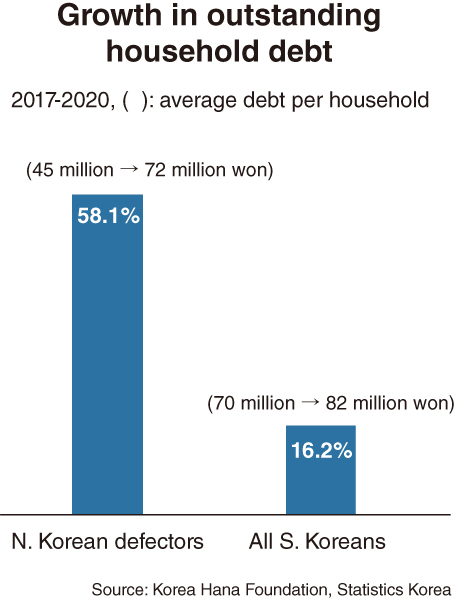[News Focus] NK defectors’ debt growth far outstrips national average
Household debt of refugees up 58% since 2017
By Kim Yon-sePublished : July 15, 2021 - 17:40

SEJONG -- The debt held by refugees from North Korea is catching up with the average for South Korean households, data for last year shows.
According to the Korea Hana Foundation and Statistics Korea, households that include at least one North Korean refugee saw their outstanding debt reach an all-time high of 72.06 million won ($62,660) on average in 2020, compared to 61.56 million won a year earlier.
Compared to 2017, when the nation started compiling the relevant figures, their debts have increased 58.1 percent.
Further, the 2020 figure -- 72.06 million won -- showed a narrowed disparity with the debt of 82.56 million won held by all South Korean households in the year.

In contrast, the average outstanding debt for all households in South Korea increased by only 16.2 percent for the same three years from 70.99 million won per household.
“Though ordinary Korean households are also saddled with huge financial debt from apartment purchases or others, there is a need to pay attention to the liability of North Korean refugees, many of whom are suffering from a tougher job market,” said a labor research analyst.
He pointed to the fact that nearly 1 in 4 defectors, or 23.6 percent, were ridden with household debt worth 100 million won or over as of last year.
The next on the list were those (15.3 percent) with debts ranging between 50 million and 100 million won and those (27.4 percent) with debt ranging between 20 million and 50 million won.
Average debt held by North Korean refugees in their 20s grew 115 percent from 37.43 million won in 2017 to 80.79 million won in 2020. Likewise, those in their 30s saw their household debt increase by 70.3 percent to 78.53 million won.
This might be because of mortgage-backed house purchases by households of younger refugees -- including those who are married to South-born nationals.
The hiring market is also not favorable to defectors. While South Korea has been posting quite low employment rates among the 37 members of the Organization for Economic Cooperation and Development, the figure further goes down when it comes to refugees.
The defectors posted a 54.4 percent employment rate in 2020, below the national average of 59.1 percent, according to Statistics Korea.
While the unemployment rate for defectors reached 9.4 percent last year, the overall figure for Koreans stood at 4.1 percent.
Data suggests that those whose residing period in the South was less than three years were having difficulty with jobs. The employment rate for those with three-year careers here stayed at 45 percent with the jobless rate posting 14.5 percent.
The employment rate and jobless rate for female refugees were more critical, with the figures posting 49.3 percent and 11.4 percent, respectively.
In a comparison of those in their 20s to those in their 50s, the jobless rate was the highest among those in their 20s (both for men and women), at 12 percent in 2020.
By Kim Yon-se (kys@heraldcorp.com)




![[Herald Interview] 'Amid aging population, Korea to invite more young professionals from overseas'](http://res.heraldm.com/phpwas/restmb_idxmake.php?idx=644&simg=/content/image/2024/04/24/20240424050844_0.jpg&u=20240424200058)














